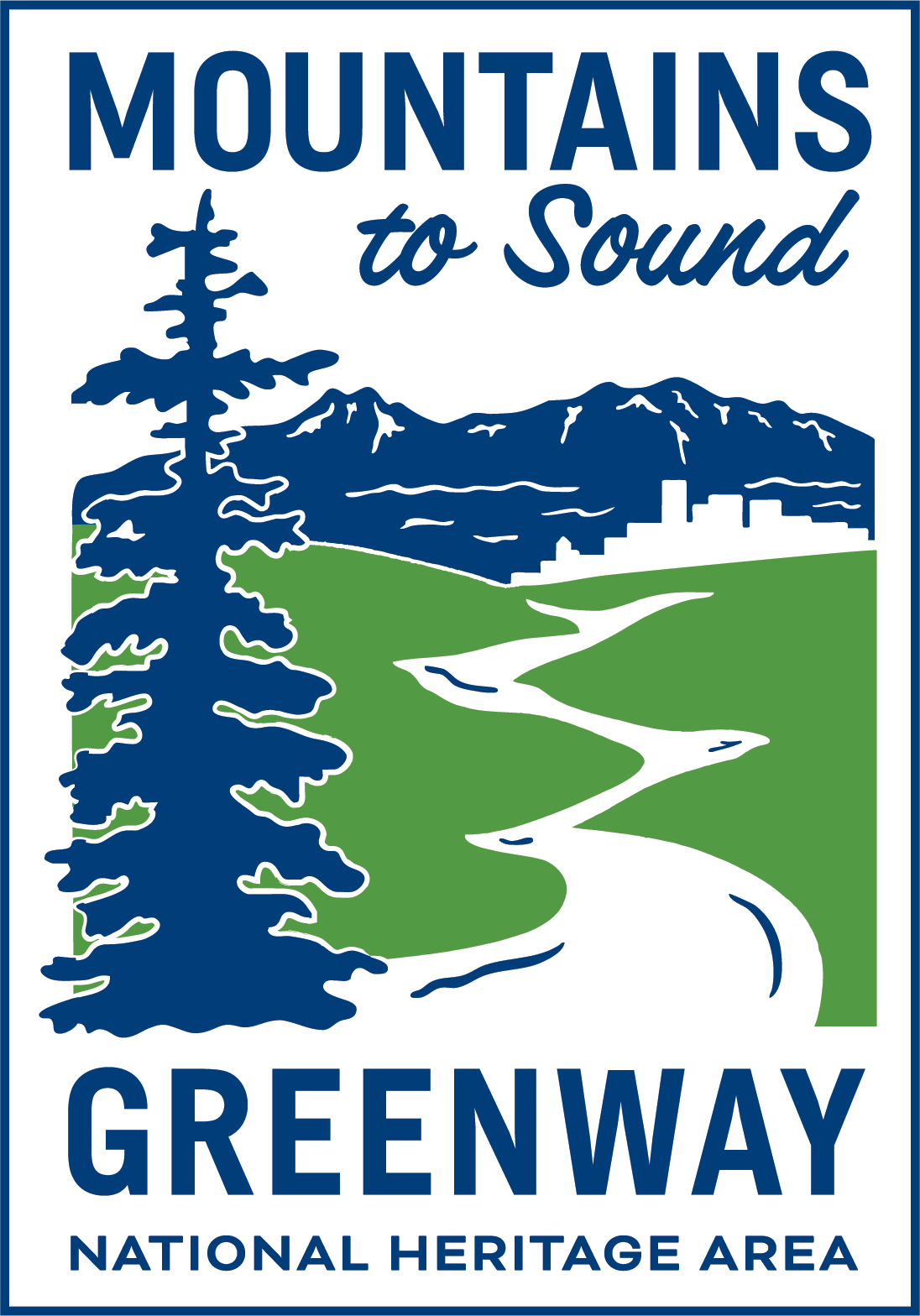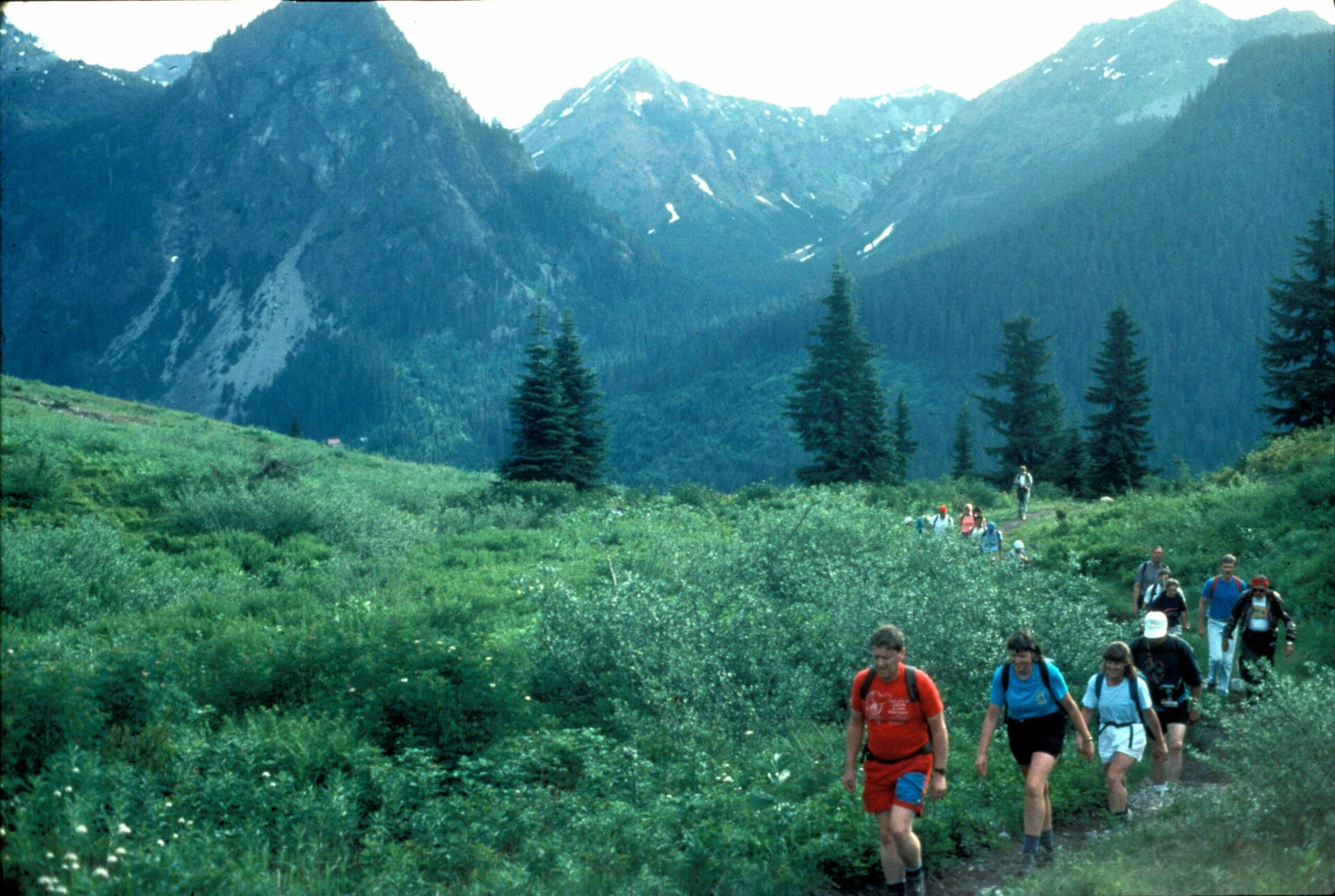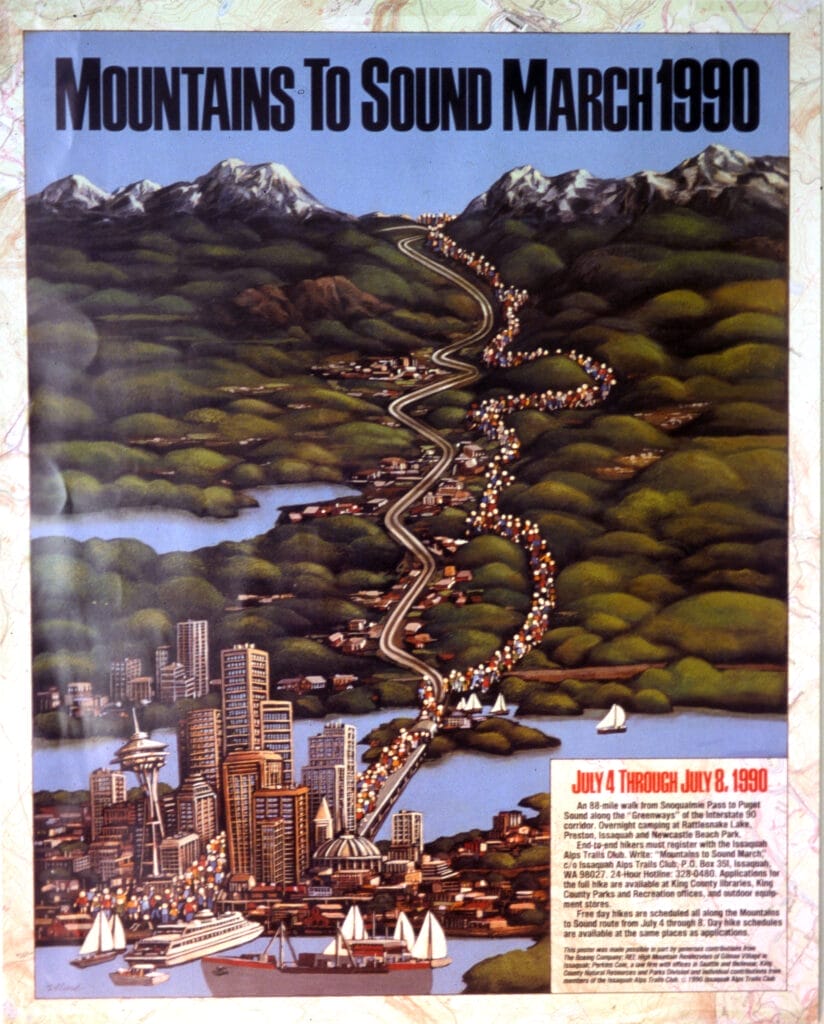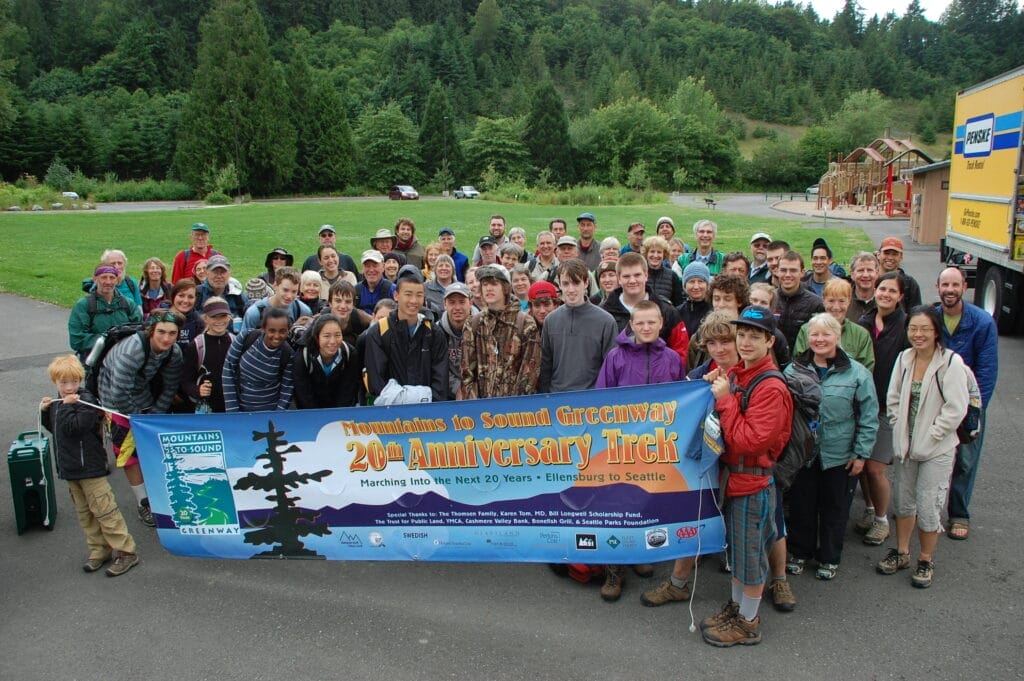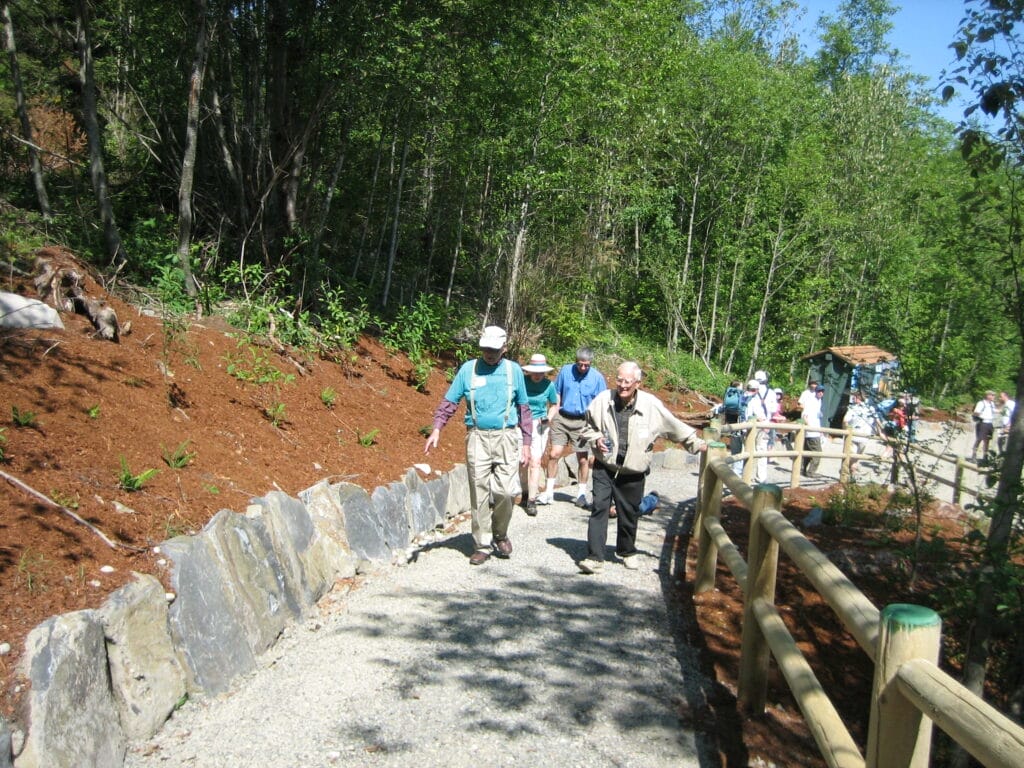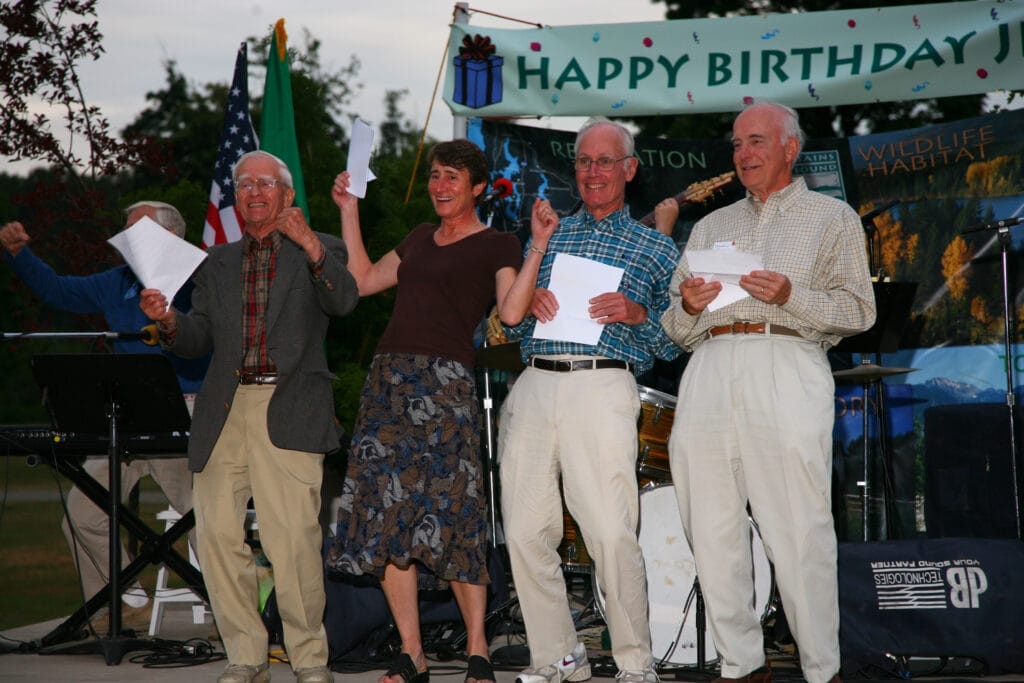The Mountains to Sound Greenway Trust is a catalyst for action that brings together diverse interest groups to create a shared vision: healthy, vital, livable communities and habitats within the Mountains to Sound Greenway National Heritage Area. It is made up of environmentalists and timber companies; developers and farmers; federal and state agencies; cities and counties; nonprofits and businesses. These unique and vital partnerships have conserved many treasured places across the Greenway that we enjoy today—nearly 60 percent of which are now publicly owned forests, mountains, trails, and waterways.
The Issaquah Alps Trails Club Shapes The Greenway Concept
The story of the Greenway Trust begins with a group of environmentalists at the Issaquah Alps Trails Club who were forging a movement to preserve the forests of the region by guiding hikers through unnamed, nascent trails—sparking a lifelong dedication to nature that would protect the Issaquah Alps and create one of the state’s first national heritage areas along the Interstate 90 corridor.
Before the Greenway Trust was founded, the Issaquah Alps Trails Club worked to build a trail network through mountains that were folded within a patchwork of private and public lands, some of which were being clear-cut at a rapid rate by timber companies and were littered with abandoned stolen cars as these natural places were used as dumping grounds. Other areas, like Squak Mountain, were being cut into by four-wheel riders and motorcyclists.
After years of guided hikes and trail creation, the leaders of the Issaquah Alps Trails Club wanted to galvanize public support for trails to address issues facing their area. Leaders of the IATC were passionate about protecting the trails and forests of the “Issaquah Alps,” a name coined by hiking guide writer Harvey Manning to describe the foothills of Tiger, Squak, and Cougar mountains. The hope was that if a forest had a name and an accessible trail, it would be respected as a place worth taking care of for generations.

The Mountains to Sound Greenway March – 1990

It became increasingly clear that rapid population growth threatened the character of the region. With a budding tech industry rooting so close to a highway flanked by wilderness, many within the Issaquah Alps Trails Club felt it was only a matter of time before expanding cities would overflow into the lush landscape and turn it into an urban strip of towering buildings. Unchecked, one could easily see development along Interstate 90, stretching from Seattle through the Cascade Mountains.
Using Harvey Manning’s “Boots on the Ground” concept, leaders of the Issaquah Alps Trails Club sought to give people a meaningful connection to the outdoors that would inspire them to protect it. The idea for the Mountains to Sound Greenway began taking shape in 1990 when Jack Hornung and the Issaquah Alps Trails Club planned an 88-mile march from Snoqualmie Pass to the Puget Sound to show that the region deserved protection. Hundreds of local residents, led by political leaders and members of the Issaquah Alps Trails Club, staged a march from Snoqualmie Pass to the Seattle waterfront. They were joined by local officials like Gary Locke, who served two terms (1997-2005) as Washington’s Governor, and former Public Commissioner Brian Boyle who decided it was time to make a change on the landscape—before it was too late.
Hikers began their journey on the Mountains to Sound Greenway March on July 4, 1990, in the Snoqualmie Pass, leading them through tough terrain that led to many blisters, fireworks, and an unexpected sprinkler incident that kept trekkers on their toes. After days of walking and camping on rugged paths, the leaders of the Mountains to Sound Greenway March invited community members to take that enthusiasm for the region beyond the trail. On July 8, the march ended with rousing speeches from civic leaders like Harvey Manning and Jim Ellis at New Castle Beach Park. This five-day event marked the birth of the Greenway as a concept, which then blossomed into the organization now known as the Mountains to Sound Greenway Trust.
The Beginning of the Mountains to Sound Greenway Trust – 1991
With momentum building from the Mountains to Sound Greenway March, political leaders who took part in the march met at the Trust for Public Lands Office in Seattle to turn the Greenway concept into an organization. They felt they couldn’t just conserve lands around Issaquah because they knew a surge of people would soon be moving into the areas along the Interstate 90 corridor. During those meetings, the new coalition decided to tap Jim Ellis as the Greenway Trust’s first president. Ellis believed that “a multi-purpose Greenway would preserve and enhance the scenic heart” of the route people traversed during the Mountains to Sound March.
Under civic leader Jim Ellis, Public Lands Commissioner Brian Boyle, and Ted Thomsen, the Greenway Trust was born to develop a greenway along Interstate 90 from Puget Sound to the Cascade Mountains. Inspired by the pioneering work of Harvey Manning, Jack Hornung, Ted Thomsen, the Mountaineers, and other members of the Issaquah Alps Trails Club, the new coalition spent several meetings poring over maps and bringing multiple perspectives to the table. Everything from wildlife protection and outdoor recreation to commercial forestry and historic preservation was considered to assemble facts about the region that they could share with government agencies.
As the Greenway Trust worked collaboratively through milestones—like helping secure the country’s first National Scenic Byway designation for Interstate 90 in 1998, and later, successfully advocating for the Mountains to Sound Greenway National Heritage Area designation in 2019—the original vision for the Greenway began to unfold into a multitude of partnerships that helped conserve more than 360,000 acres of land within the 1.5 million-acre landscape.

Today, the coalition that makes up the Greenway Trust encompasses a 60-member Board of Directors, a 40-member Board of Advisors, a 50-member Technical Advisory Council, many additional working committees, over a dozen staff members, conservation corps crews outdoors restoring public parks and river corridors, and a community of hundreds of citizens and dozens of interest groups.
Together, we are balancing thoughtful development and conservation, in ways big and small, in order to preserve the natural landscapes and ecosystems that define the region’s character, while recognizing the cultural and historic significance of these lands.

Loved Locally, Nationally Significant
Our local pride and joy is also a national treasure. In 1998, the Mountains to Sound Greenway on Interstate 90 was the first interstate highway in the United States to be designated as a National Scenic Byway. And in 2019, this landscape was also congressionally designated as a National Heritage Area.
